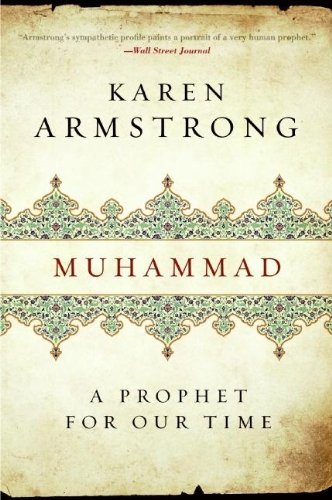Book review: Muhammed, A Prophet For Our Time
by Karen Armstrong
★★★★★
In 1991, Karen published a biography of Muhammed, the founder of Islam. In 2006, she published this updated biography, hoping to focus more on his life and teachings that contradict the image of Muslim extremism, so that we Americans could put September 11 behind us and recognize Islam as a religion of peace. I haven’t read the first book, but I definitely enjoyed the second.
This is not the story of Islam or an interpretation of its scriptures. It is just a sympathetic biography of its founder. While Karen gives us both the dirt and the glory, she manages to put Mohammed’s story in its societal setting so that we can grasp his original teachings and decisions.
Mohammed’s laws, for example, were designed for a small, struggling community, never for the vast empire that succeeded him. His jihad, which does not mean “holy war” but which means “struggle,” was a tireless campaign against greed, injustice, and arrogance.
Arabs in Mohammed’s time did not feel it was necessary to convert to Judaism or Christianity, because they believed that they were already members of the Abrahamic family. In fact, the idea of conversion from one faith to another was alien. Pluralism was the more natural belief, and Muhammed embraced pluralism. A verse often quoted to prove Islamic exclusive beliefs actually means just the opposite:
“For if one goes in search of a religion other than islam unto God, it will never be accepted from him, and in the life to come, he shall be among the lost.”
Of course, Muhammed did not call his religion “islam”; the word simply meant self-surrender, and had nothing to do with a particular denomination or belief. In its original context, the teaching meant just the opposite of exclusivism. Muhammed hated sectarian quarrels, and was offended by the idea of a “chosen people.”
But Muhammed did believe reform was necessary. He despised the suppression of Arab women, and he could not condone any caste which separated those with money from those without. He personally gave a large percentage of his earnings to the poor, and expected the same selflessness from his little band of followers. All such kindnesses would be rewarded in paradise, he promised.
Does that mean the stories of Muhammed’s wars and raiding expeditions are rumors? No, and here Karen shows a little too much sympathy, as she explains the cultural expectations. A clan could hardly support itself without raiding, she explains! Stories of Muhammed’s harem are juicy as well. Nevertheless, this appears to be an honest portrait of a complex man who tried mightily to reform his little area of the world for the better. Highly recommended.












 354 Circles
354 Circles
 603 Goodreads Friends & Fans
603 Goodreads Friends & Fans

 Hello! I'm an author, historical Jesus scholar, book reviewer, and liberal Christian, which means I appreciate and attempt to exercise the humanitarian teachings of Jesus without getting hung up on any particular supernatural or religious beliefs.
The Bible is a magnificent book that has inspired and spiritually fed generations for thousands of years, and each new century seems to bring a deeper understanding of life’s purpose. This is true of not only Christianity; through the years, our age-old religions are slowly transforming from superstitious rituals into humanitarian philosophies. In short, we are growing up, and I am thrilled to be riding the wave.
I avidly read all thought-provoking religion titles. New authors: I'd love to read and review your book!
Hello! I'm an author, historical Jesus scholar, book reviewer, and liberal Christian, which means I appreciate and attempt to exercise the humanitarian teachings of Jesus without getting hung up on any particular supernatural or religious beliefs.
The Bible is a magnificent book that has inspired and spiritually fed generations for thousands of years, and each new century seems to bring a deeper understanding of life’s purpose. This is true of not only Christianity; through the years, our age-old religions are slowly transforming from superstitious rituals into humanitarian philosophies. In short, we are growing up, and I am thrilled to be riding the wave.
I avidly read all thought-provoking religion titles. New authors: I'd love to read and review your book!
 Hi! While Lee writes the articles and reviews the books, I edit, organize, and maintain the blog. The views expressed here are Lee's but I'm his biggest supporter! :-)
Hi! While Lee writes the articles and reviews the books, I edit, organize, and maintain the blog. The views expressed here are Lee's but I'm his biggest supporter! :-)
Connect With Me!